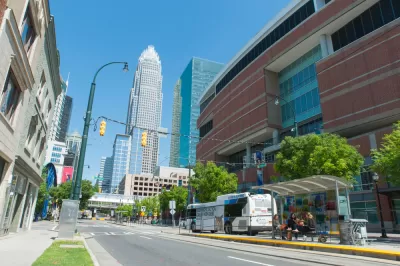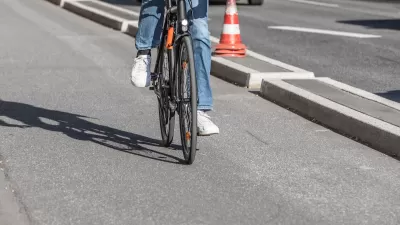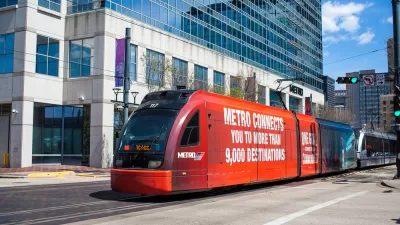The city’s newly approved Strategic Mobility Plan highlights the need for better options when it comes to walking, biking, and public transit, setting a goal to reduce driving to half of total trips.

Charlotte, North Carolina’s city council has approved a Strategic Mobility Plan that seeks to improve public transit options, reduce driving, eliminate traffic deaths, and increase economic mobility for public transit users. According to an article in Smart Cities Dive by Austyn Gaffney, “That effort follows a 2014 study out of Harvard and the University of California, Berkeley that ranked Charlotte last out of the nation’s 50 largest commuting zones for intergenerational, or economically upward, mobility.”
“[At-large city council member Braxton Winston] said the next step for community input would be identifying and prioritizing individual projects that address the plan’s goals.” Meanwhile, the city needs support at the state level to levy a new tax to support the plan, which does not yet have dedicated funding sources.
Alvaro Villagran, director of federal programs for the Shared-Use Mobility Center, “said the Charlotte program follows a general trend of cities moving away from a highway-oriented or street management perspective on transportation to an integration of shared mobility options like public transit, electric vehicles, cycling and pedestrian use.” The plan includes a goal of shifting to a 50-50 mode share, where half of trips or fewer are taken by single-occupancy vehicle. According to Villagran, “Instead of just disincentivizing cars, he said, communities need to make alternative modes of mobility realistic options for residents.”
FULL STORY: Charlotte mobility plan aims to slash car use, transform access to lower-emission options

Planetizen Federal Action Tracker
A weekly monitor of how Trump’s orders and actions are impacting planners and planning in America.

Congressman Proposes Bill to Rename DC Metro “Trump Train”
The Make Autorail Great Again Act would withhold federal funding to the system until the Washington Metropolitan Area Transit Authority (WMATA), rebrands as the Washington Metropolitan Authority for Greater Access (WMAGA).

DARTSpace Platform Streamlines Dallas TOD Application Process
The Dallas transit agency hopes a shorter permitting timeline will boost transit-oriented development around rail stations.

The Tiny, Adorable $7,000 Car Turning Japan Onto EVs
The single seat Mibot charges from a regular plug in about as much time as an iPad, and is about half the price of an average EV.

Supreme Court Ruling in Pipeline Case Guts Federal Environmental Law
The decision limits the scope of a federal law that mandates extensive environmental impact reviews of energy, infrastructure, and transportation projects.

Texas State Bills to Defund Dallas Transit Die
DART would have seen a 30% service cut, $230M annual losses had the bills survived.
Urban Design for Planners 1: Software Tools
This six-course series explores essential urban design concepts using open source software and equips planners with the tools they need to participate fully in the urban design process.
Planning for Universal Design
Learn the tools for implementing Universal Design in planning regulations.
Roanoke Valley-Alleghany Regional Commission
City of Mt Shasta
City of Camden Redevelopment Agency
City of Astoria
Transportation Research & Education Center (TREC) at Portland State University
US High Speed Rail Association
City of Camden Redevelopment Agency
Municipality of Princeton (NJ)





























